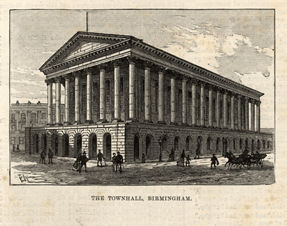
Early engraving of Town Hall
[Local Studies: LF F18.2]

Report of antislavery meeting at Town Hall, 1838 [City Archives: MS 1587/48]

Funding for The Negro Emancipation Schools, 1838. [Local Studies: F18.2 Baptists Vol. 'Heneage']
Sturge's Antislavery Speeches
Birmingham Town Hall has played a vital role in campaigns for social justice. This site became a prominent stage for a whole range of Sturge's different social causes. He gave many speeches here on behalf of the 'Birmingham Anti-Slavery Society', compelling his audience to understand that slavery was not a 'foreign' issue, but a moral problem which confronted everyone.
Sturge also held meetings at the Town Hall for 'The Complete Suffrage Union' (a non-violent 'chartist' group in favour of the working class vote) and for the Birmingham Temperance Society (an anti-drinking organisation).
One particularly significant meeting at Town Hall took place on August 1th, 1838. This date marked the end of the apprentice system in the West Indies, a campaign which had become personally associated with Sturge. To mark the occasion, he led a march of schoolchildren from Town Hall to Heneage Street, where he laid a foundation stone for the Negro Emancipation Schools.





